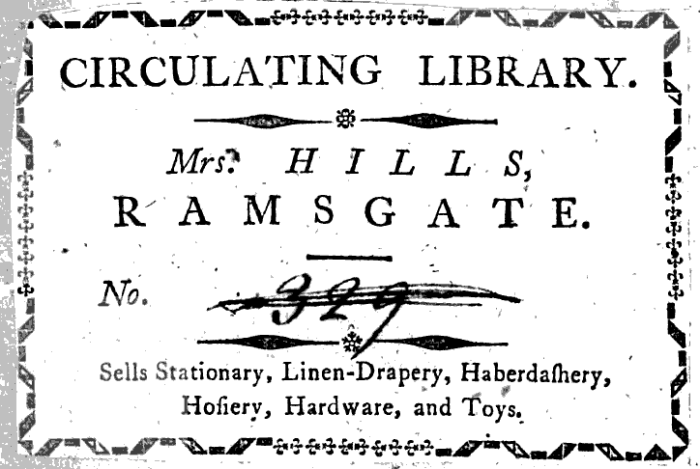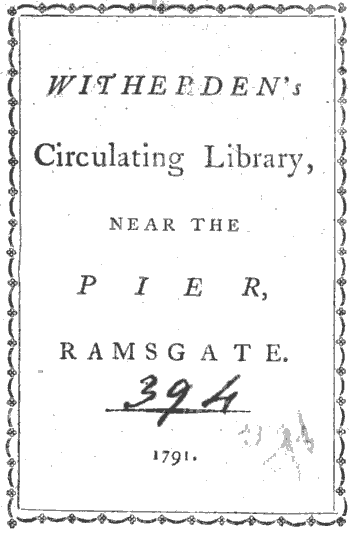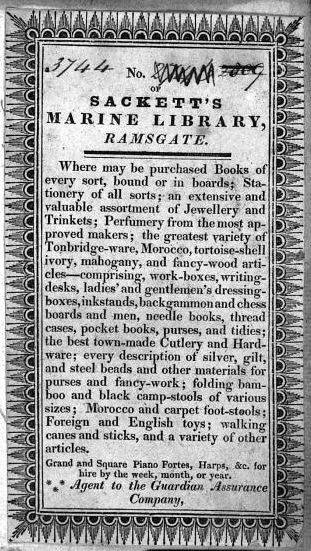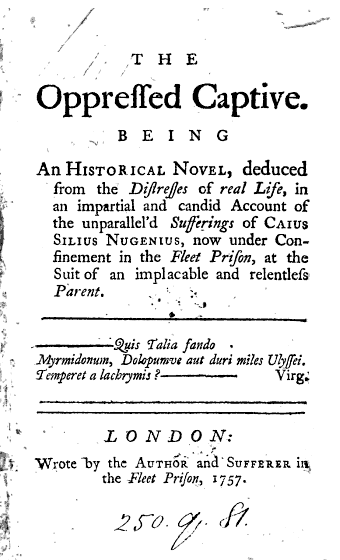
I came across this book when I was wading through some search or other on Google Books. The book itself, titled The Oppressed Captive, is not very remarkable, but it contains no less than THREE book-plates from different circulating libraries! This little volume must have made its way all ’round Ramsgate, a resort-town in Kent on the east coast of England. Pride and Prejudice fans will recognize it as the seaside spot where Wickham seduced Georgiana Darcy.

The free public libraries we are familiar with only became widespread in the later 19th century. These circulating libraries were private, for-profit ventures that resembled modern boutique gift-shops more than modern libraries. Two of the three bookplates in The Oppressed Captive advertise the many other wares besides books to be bought or rented there. Sackett’s Marine Library (book-plate pictured below), sold everything from silverware to insurance! They also rented out “Piano Fortes, Harps, &c. . . . by the week, month, or year,” a service which must have been calculated to appeal to the accomplished (and moneyed) gentlefolk who visited Ramsgate for health or for fun. Whether an Accomplished Young Person needed a writing desk, beads for a fancy purse, needles for sewing, or the latest collection of poetry, circulating libraries would provide!
Jane Austen’s unfinished novel Sanditon, set in an up-and-coming sea-side resort, mentions a circulating library. Its subscription book functions, like the Pump-Room book in Bath, as a record of fashionable visitors currently in residence (Chapter 6), but it’s also a place to buy “new parasols, new gloves, and new brooches” (Chapter 2). Guidebooks to sea-bathing places describe libraries as one of the amenities genteel tourists need to know about. Mrs. Witherden’s library is mentioned along with another Ramsgate library run by a Mr. Burgess in A Short Description of the Isle of Thanet: Being Chiefly Intended as a Directory for the Company Resorting to Margate, Ramsgate, and Broadstairs (1796 edition, expanded 1815 edition). Add those to the two other libraries recorded in The Oppressed Captive, and we find there were as many as four libraries in Ramsgate, although perhaps not simultaneously!

The circulating libraries did not only make money by selling other products, they required subscription fees for the privilege of borrowing books. Fanny Price, the quiet heroine of Austen’s Mansfield Park, revels in her membership in a library in Portsmouth and shares its bounty with her younger sister Susan:
There were none [no books] in her father’s house; but wealth is luxurious and daring, and some of hers found its way to a circulating library. She became a subscriber; amazed at being anything in propria persona, amazed at her own doings in every way, to be a renter, a chuser of books! And to be having any one’s improvement in view in her choice! But so it was. Susan had read nothing, and Fanny longed to give her a share in her own first pleasures, and inspire a taste for the biography and poetry which she delighted in herself.
–Mansfield Park, Chapter 40
I just love the image of timid little Fanny feeling “luxurious and daring” because she spends money on a library subscription! I certainly remember feeling a certain amount of power when I got my own library card as a child, and could choose my own books and check them out by myself.

I doubt that The Oppressed Captive would have appealed to Fanny- it’s a sensational autobiography by the illegitimate son of an Anglo-Irish gentleman that focuses on his ill-treatment by his father and his subsequent sufferings. The title page prominently announces that the author, Robert Nugent, wrote the book while in the Fleet Prison! He thinly veils his story behind classical-sounding pseudonyms and calls it a “Historical Novel,” a term meant to suggest that it was a story based on facts- it’s not historical fiction in the modern sense of the term. If you’d like to know what the patrons of three of Ramsgate’s circulating libraries found so attractive about this book, you can read the full text at Google Books. If you’d like to read poor Robert Nugent’s story with a little more context, a biography of his father was written by a descendant in 1898- it’s also available on Google Books.
I wonder if this book made the rounds because no one wanted to buy it – it seems, from the little I’ve seen in letters & diaries, that subscribers could purchase books (funds then going to provide more new books!).
What a great find – and a very informative post.
LikeLike
Thanks! That’s a good point- I hadn’t thought of the possibility that this book might have been an unloved orphan in the circulating libraries of Ramsgate- perhaps as a “ripped from the headlines” autobiography, it just didn’t grip the readers for long enough to make them want to buy it.
LikeLike
This is mere conjecture on my part, my dear Lady Smatter, (ie, I’ve not really looked into Circulating Libraries; but must do so!), based on comments like this one, in the diary of the future Emma Austen (nee Smith):
Oct 25, 1827 — “We attended the sale of club books at Mr Blackstone’s”
or this one (Mr Blackstone – again!), three years prior:
Oct 12, 1824 — “Mamma, Aunt Chute, Caroline, Augusta & Fanny went to the sale of the society books at Mr Blackstone’s”
It made sense (though my guess could be incorrect) that a book ‘circulated’ – and then was sold; and if you wanted it, you could buy it — “used” so to speak. Gave them funds to buy more, and got rid of what, perhaps, had ceased to circulate. And maybe less-well-endowed societies could then buy last year’s best sellers for their clients?
k
LikeLike